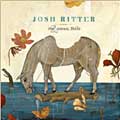
| << Front page | Arts | April 21, 2006 |
CD Review
 |
| Josh Ritter - The Animal Years V2 Music |
Josh Ritter OC ’99 released his album The Animal Years last week. This is the 29 year-old artist’s third effort, after 2002’s well-received The Golden Age of Radio and 2003’s Hello Starling. The Animal Years is his first album from V2 Records, a major label better known for artists as diverse as Moby and the White Stripes.
The Animal Years falls into yet another genre, that of the singer-songwriter. Ritter is a folk musician to the core, and his album is reminiscent of classic folk heroes like Simon and Garfunkel and Bob Dylan. In fact, Ritter attributes his start in music at age 18 to Dylan’s Nashville Skyline; many of his new songs echo the folk sensibilities of Dylan.
The 11 tracks on The Animal Years are based heavily on guitar. Evidence of production and electronics are, when present, subtle and understated, leaving room for Ritter’s vocals and guitar to stand out. Using familiar folk elements in his vocals and guitar style, his lyrics speak to another era. He often references symbols of a time of traditional folk — bonnets, battlefields and chariots are interspersed throughout his songs in a way that give the tracks a timeless feel.
The Animal Years starts out strong with “Girl in the War,” a soft but catchy song that speaks to Ritter’s Oberlin roots. It is plainly and unabashedly anti-Iraq war, using a conversation between St. Peter and St. Paul on “what it is we done” to get involved in a war. The second track, “Wolves,” is an easy candidate for a single with its catchy guitar chords and memorable chorus, pretty much guaranteed to keep you humming. The snare drum and twinkly guitar in “Monster Ballads,” The Animal Years’ third track, are clear throwbacks to Ritter’s folk roots.
However, the album has its weak spots. “Lillian Egypt” is a little overeager and comes off as stale in comparison to Ritter’s well-crafted, softer songs. The penultimate track, “Thin Blue Flame,” is another song that perhaps strives for more than Ritter can deliver; while its subject matter is clearly close to his heart, expressing more anti-war sentiment, it clocks in at over six minutes and is repetitive without being catchy.
Ritter is at his best when he adheres to the cardinal rule of singer-songwriters – keep it simple. Songs like “In the Dark,” “One More Mouth” and “Good Man” are easily digestible nuggets of folk sensibility. The album’s most vocally adventurous song, “Idaho,” is an exquisitely crafted a cappella ballad to his home state that was recorded spontaneously and stands out as a testament to his singing chops.
The Animal Years is an all-over solid album and an impressive feat for
Ritter. His talent lies in his ability to tap into the best of folk music
tradition and bring to it his own sensibilities. In using a familiar medium to
speak to issues that music has seemingly neglected as of late, Ritter finds and
fills his niche perfectly.
About us
Subscriptions
Advertising